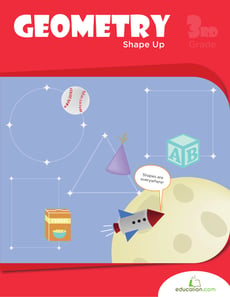3rd Grade Two-Dimensional Shapes Workbooks
About 3rd Grade Two-dimensional Shapes Workbooks
On Education.com, 3rd grade two-dimensional shapes workbooks introduce students to shapes like squares, rectangles, triangles, circles, and polygons. These workbooks provide practice in identifying, classifying, and comparing shapes, helping students build a strong foundation in geometry. Worksheets include activities such as shape sorting, pattern recognition, and drawing exercises, which support hands-on learning experiences.
Educational resources for 3rd grade, such as printable worksheets, interactive crafts, and digital games, reinforce geometric concepts while making learning engaging and interactive. These materials encourage children to recognize shapes in real-world objects, enhance visual-spatial thinking, and develop spatial awareness. Each resource is designed to provide children with enjoyable, educational practice that enhances problem-solving skills.
Using these resources at home or in the classroom allows parents and teachers to create structured learning routines that strengthen geometric understanding. Educators can incorporate shape activities into math lessons, while parents can provide supplemental practice to extend learning beyond the classroom. This exposure fosters confidence in geometry and supports broader mathematical development.
Educational resources for 3rd grade, such as printable worksheets, interactive crafts, and digital games, reinforce geometric concepts while making learning engaging and interactive. These materials encourage children to recognize shapes in real-world objects, enhance visual-spatial thinking, and develop spatial awareness. Each resource is designed to provide children with enjoyable, educational practice that enhances problem-solving skills.
Using these resources at home or in the classroom allows parents and teachers to create structured learning routines that strengthen geometric understanding. Educators can incorporate shape activities into math lessons, while parents can provide supplemental practice to extend learning beyond the classroom. This exposure fosters confidence in geometry and supports broader mathematical development.

